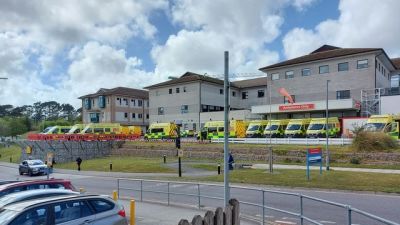More than half of ambulances in the South West have to wait over an hour outside A&E

More than half of patients in the South West had to wait for more than an hour in an ambulance before they could be admitted to hospital.
The figures have been revealed in the latest government statistics and show the chances of waiting for more than an hour in the South West is double that of the national average.
On New Year's Day, Royal Cornwall Hospital had the worst delays in England at 83.1% and over the festive season 68.1% of patients waited for more than an hour in an ambulance outside the hospital at Treliske.
Other hospitals with lengthy delays in the period 24 December to 1 January include Gloucestershire Hospitals at 61.6% waiting more than an hour, and Royal United Hospitals at Bath were the figure was 63.3%
The high level of delays reflects the ongoing struggle faced by hospitals to find space for new arrivals.
In a statement Royal United Hospitals Bath NHS Foundation Trust said: “Like other hospitals across the country, the RUH is extremely busy at the moment, and we have been affected by rising numbers of people with flu and COVID-19 needing hospital care.
"We are also experiencing challenges discharging patients who require further support in the community. Together, these factors have affected our ability to offload ambulances as quickly as we want and we are really sorry to anyone who has been impacted by this.
“Reducing delays for patients and ambulance crews remains a top priority for us and whilst making some progress in this area, through the committed care from our staff and partners in primary and community care, we acknowledge there is still more to do. We will continue working hard with our partners, including the ambulance service, to improve this."
Prime Minister Rishi Sunak said: "The NHS is obviously under enormous pressure as we recover from Covid and I have enormous admiration for all the people working incredibly hard in the NHS right now to help get us through that.
"This winter what we want to do is make sure we move people out of hospitals into social care, into communities - that is one of the most powerful ways we can ease some of the pressures on A&E departments and ambulances that are waiting too long."
Matthew Taylor, chief executive of the NHS Confederation which represents the healthcare system in England, said the data "underlines the stark reality of the pressures that NHS leaders, their staff and patients are enduring".
He added: "As they wearily enter a new year, our members say they continue to manage crisis conditions with inherent risks to patient safety as the prospect of sustained industrial action looms large."